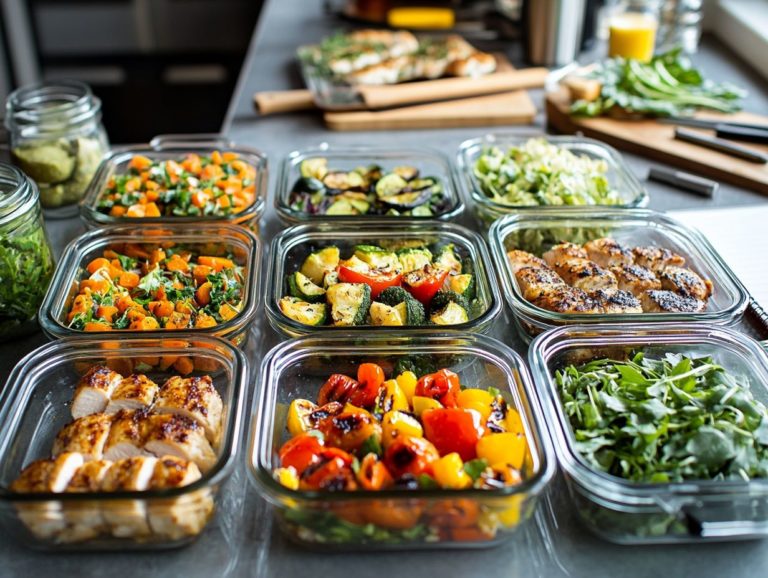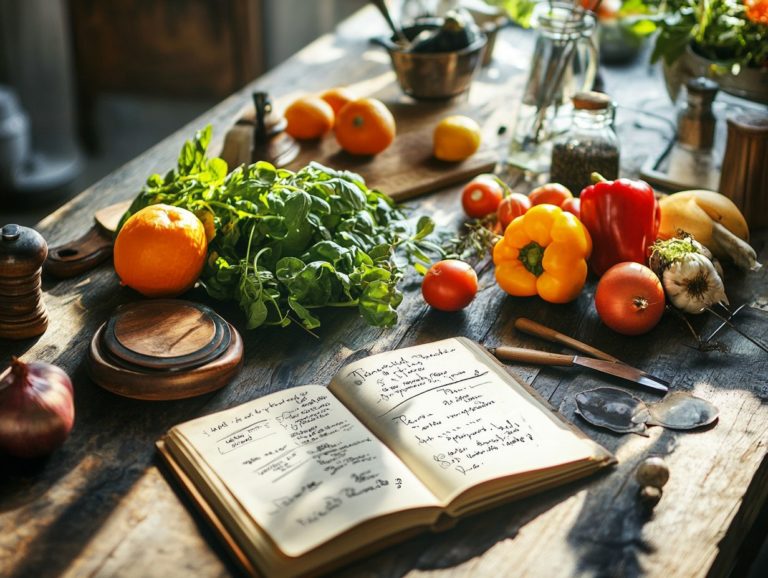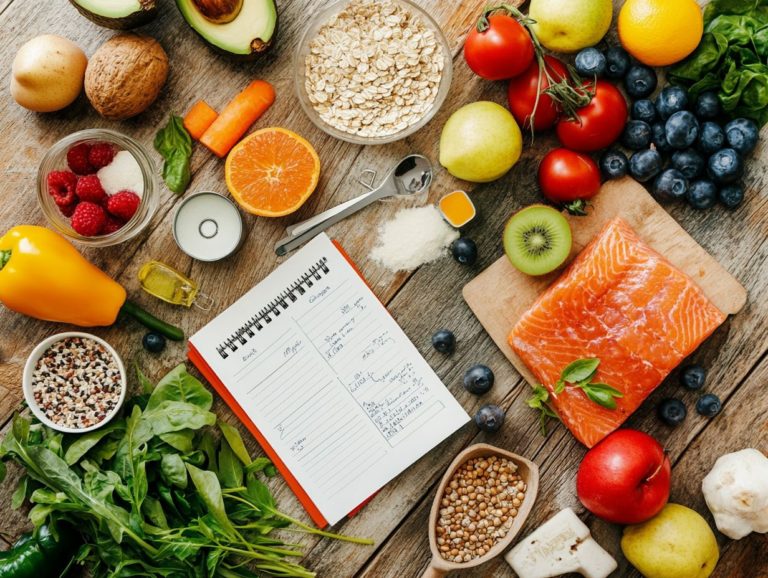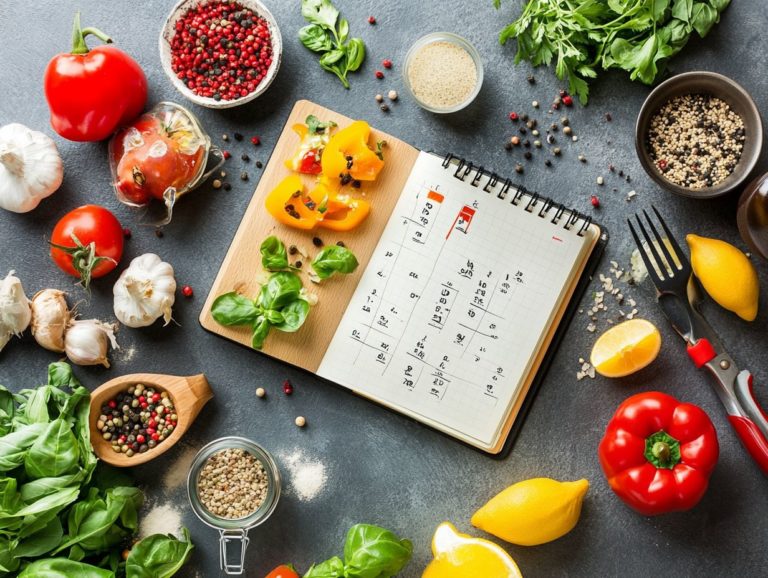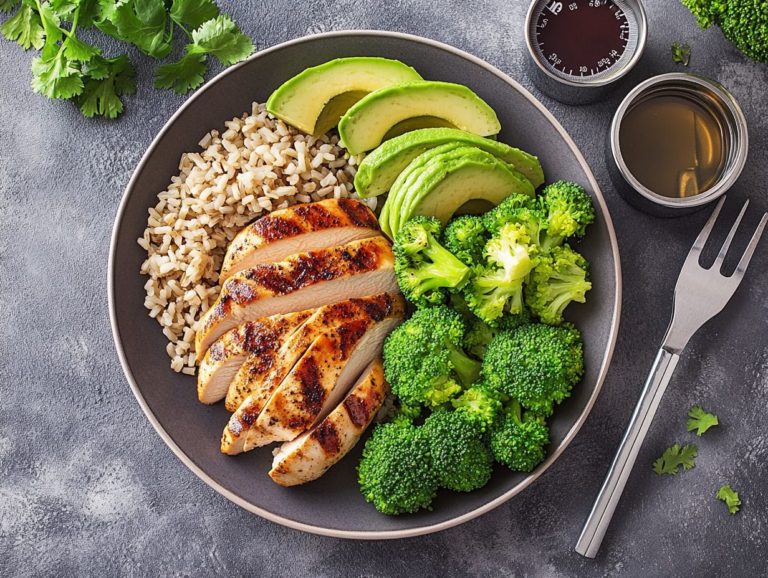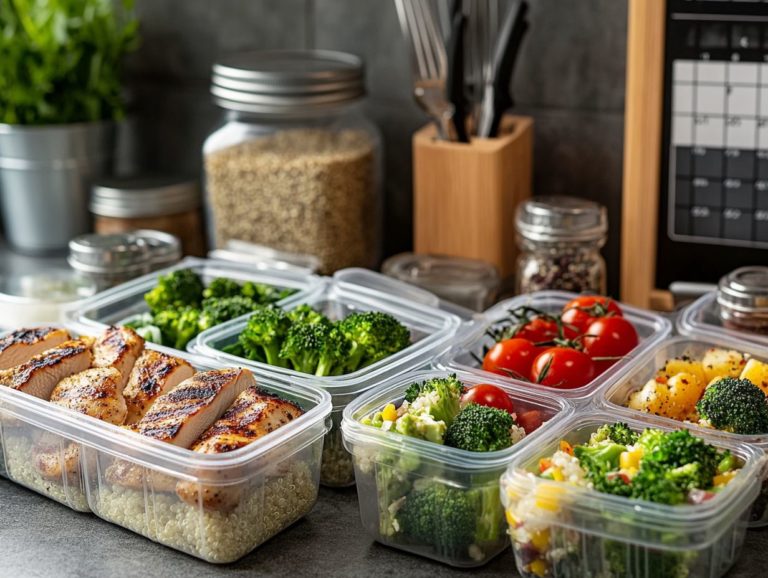How to Meal Prep for a Healthy Week
Meal prepping transcends mere trendiness; it’s a transformative approach for anyone eager to embrace healthy eating while efficiently managing their time throughout the week.
This guide will walk you through the essentials of meal prep, highlighting its many benefits, assisting you in planning your recipes, and helping you master techniques such as batch cooking and portioning.
You’ll also discover tailored tips to accommodate specific dietary needs, ensuring that meal prepping seamlessly integrates into your daily routine.
Get ready to take your cooking to the next level!
Contents
Key Takeaways:
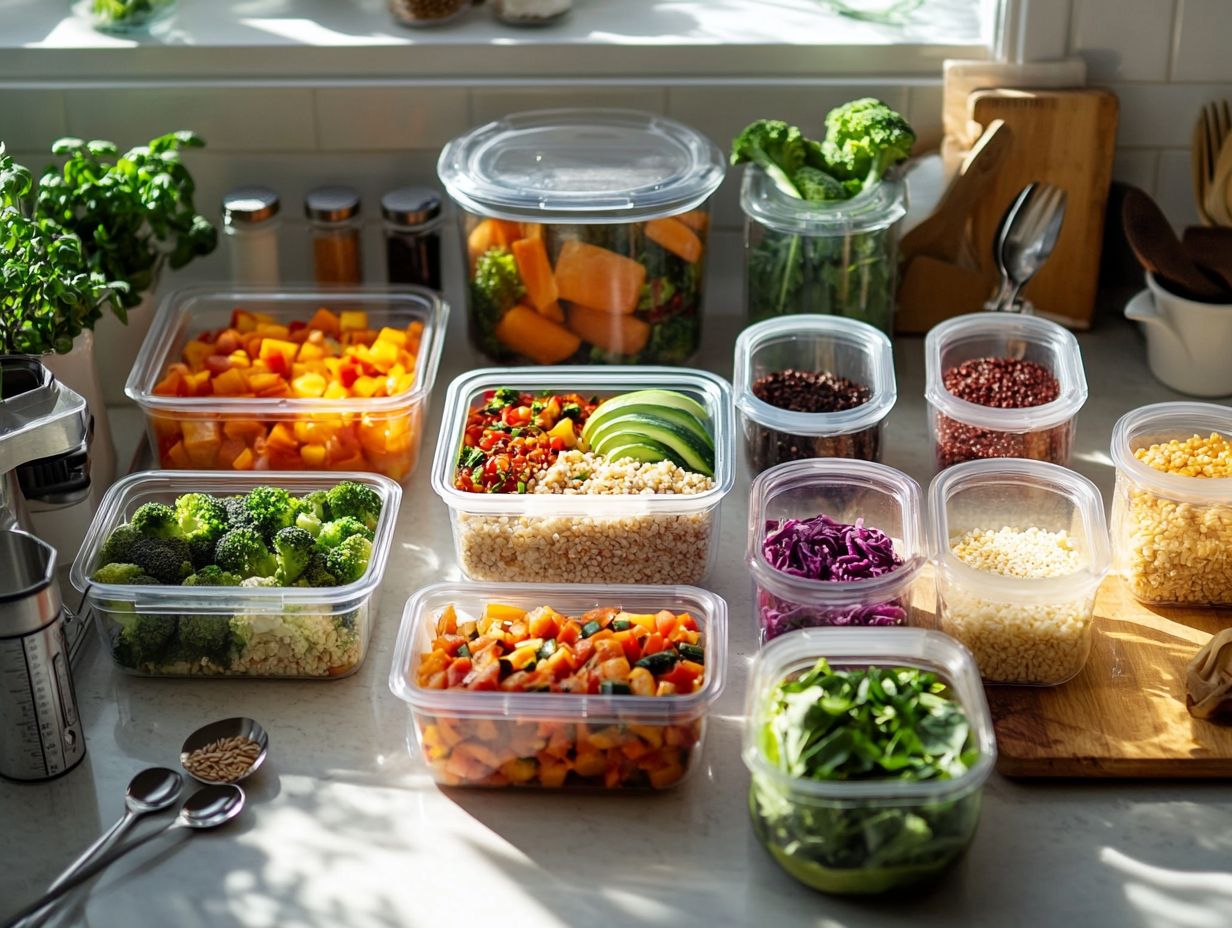
- Meal prepping is the process of preparing meals ahead of time to save time, money, and promote healthy eating habits.
- Planning and organization are key to successful meal prepping. Choose recipes and ingredients wisely, and utilize batch cooking and portioning techniques.
- Meal prepping can also cater to different dietary needs, such as vegetarian, vegan, and gluten-free options. With the right strategies and habits, it can become a sustainable and beneficial routine.
What is Meal Prepping?
Meal prepping is an art that allows you to prepare and organize your meals in advance, transforming your busy weeknights into a seamless culinary experience. This thoughtful approach not only streamlines your daily meal decisions but also encourages healthier eating habits, minimizes food waste, and upholds food safety standards.
By dedicating time to prep your meals ahead, you elevate your cooking skills and gain greater control over your dietary needs, paving the way for more nutritious meals and a well-balanced lifestyle.
Definition and Benefits
Meal prep involves the thoughtful and systematic preparation of meals in advance, encompassing everything from crafting a detailed grocery list to cooking ahead and organizing your food storage for maximum efficiency.
This practice not only streamlines your busy weekdays, but it also nurtures a healthier lifestyle by enabling you to select nutritious ingredients ahead of time. By planning your meals in advance, you can significantly minimize food waste, as proper portioning and storage help ensure that fewer leftovers end up spoiled.
Meal prepping also sparks cooking creativity, presenting an array of recipe variations. For example, batch-cooking grains or proteins provides versatile bases for an exciting range of dishes throughout the week, while clear containers keep everything organized and visually appealing. This strategic approach encourages healthier eating habits, making it a breeze to grab balanced meals on the go.
Planning for Meal Prep
Effective meal planning serves as the cornerstone of successful meal prep. It requires you to thoughtfully select recipes that align with your dietary preferences while also considering budget-friendly options.
By compiling a tailored grocery list, you set the stage for a seamless cooking experience that meets your needs and elevates your culinary endeavors.
Choosing Recipes and Ingredients
Selecting the right recipes and ingredients is essential for your meal prep success. This allows you to craft nutritious meals that align with your dietary preferences and seamlessly fit into your weekly planner.
When you choose recipes featuring protein-rich foods, it’s vital to consider not just the protein content but also the cooking techniques that can amplify flavor without compromising nutrition. Techniques like grilling, roasting, or steaming can truly elevate the taste of lean meats, legumes, and tofu. For instance, imagine enjoying grilled chicken marinated in herbs it’s a delicious and healthy dinner option. Alternatively, a quinoa salad bursting with black beans or chickpeas provides a delightful combination of protein and fiber.
By prioritizing your grocery shopping for fresh ingredients, you ensure that your meals are not only flavorful but also brimming with essential nutrients, promoting your overall health and well-being.
Meal Prep Techniques
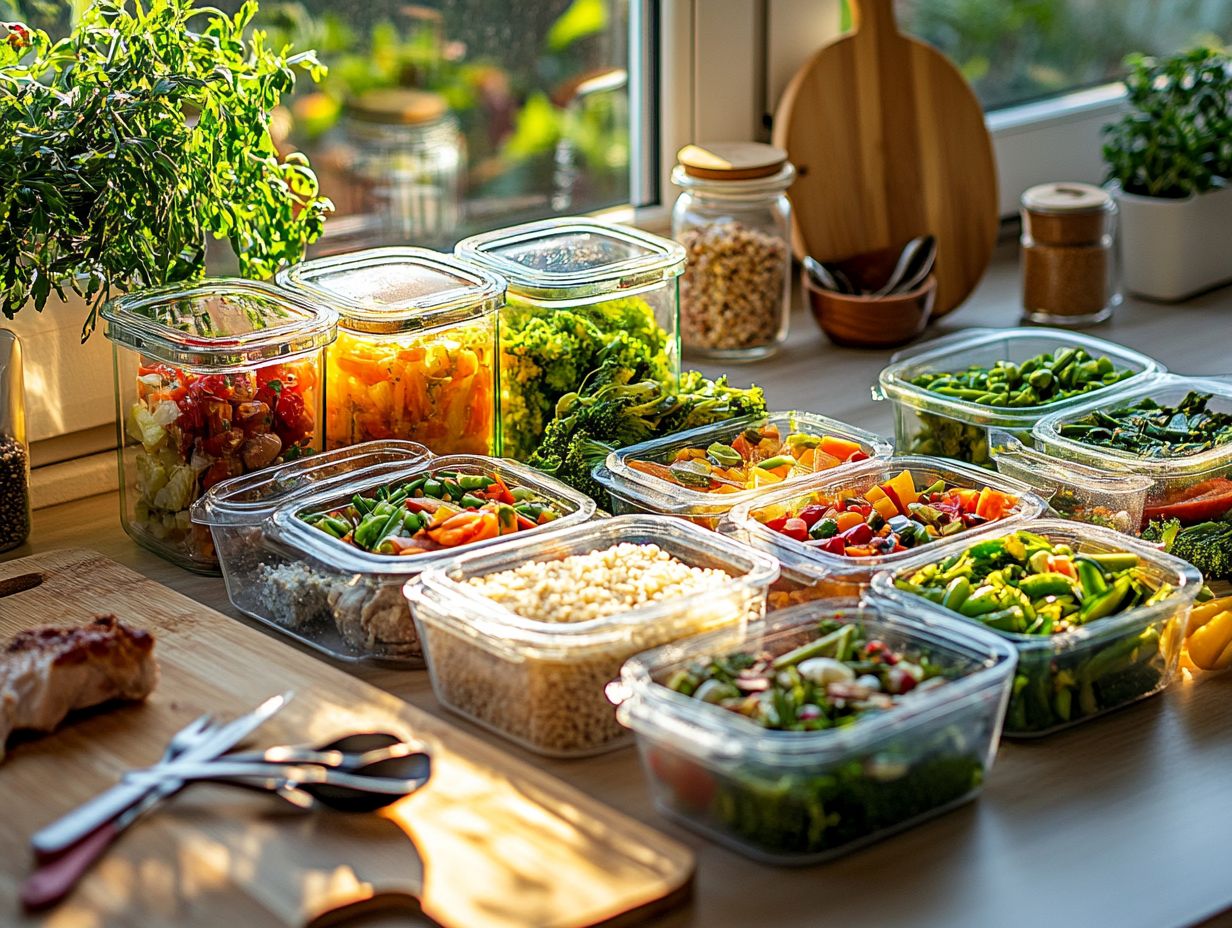
Mastering meal prep techniques like batch cooking and portioning is crucial for elevating your efficiency. Batch cooking means preparing large amounts of food at once, while portioning involves dividing meals into suitable sizes. By doing so, you ensure that quick breakfasts, effortless lunches, and nutritious dinners are readily available throughout the week.
Start meal prepping today and transform your week!
Batch Cooking and Portioning
Batch cooking involves preparing large quantities of food at once. This method allows you to store meals efficiently and enjoy easy reheating throughout the week.
Not only does this save you precious time, but it also alleviates the stress associated with daily meal prep. By focusing on a few select recipes, you can enjoy a variety of flavors while meeting your nutritional goals.
Investing in meal prep containers is a game-changer for storage. These containers come in various sizes and materials, making it simple to portion out your meals and keep everything fresh.
To reheat without sacrificing nutritional value, use gentle heating methods like microwaving at medium power or the stovetop. Adopting these practices can elevate your meal experience and foster healthier eating habits effortlessly.
Master Meal Prep: Your Key to Easy Cooking!
By implementing practical meal prep tips, you can elevate your cooking experience. This fosters organization in your kitchen, saves you valuable time, and ensures food safety, all while enabling you to prepare nutritious meals with ease.
Time-Saving Strategies and Storage Tips
Employing effective time-saving strategies can streamline your meal prep process. This allows you to efficiently store and utilize leftovers while maximizing the benefits of frozen ingredients.
Using meal prep containers helps you categorize and portion meals, optimizing fridge space and food accessibility. These containers simplify the reheating process too.
The secret to leftovers lies in repurposing them creatively. Transform last night s dinner into today s lunch or snack!
Integrating frozen ingredients into your meal planning offers remarkable flexibility. They can serve as a quick base for various dishes, saving you cooking time while reducing food waste. Keeping a stash of frozen fruits or veggies can enhance the nutritional quality of your meals with minimal effort.
Meal Prep for Specific Dietary Needs
When addressing specific dietary needs, tailor your meal prep with a variety of recipe ideas that include vegetarian, vegan, and gluten-free options. This means everyone can enjoy delicious, healthy meals!
Vegetarian, Vegan, and Gluten-Free Options
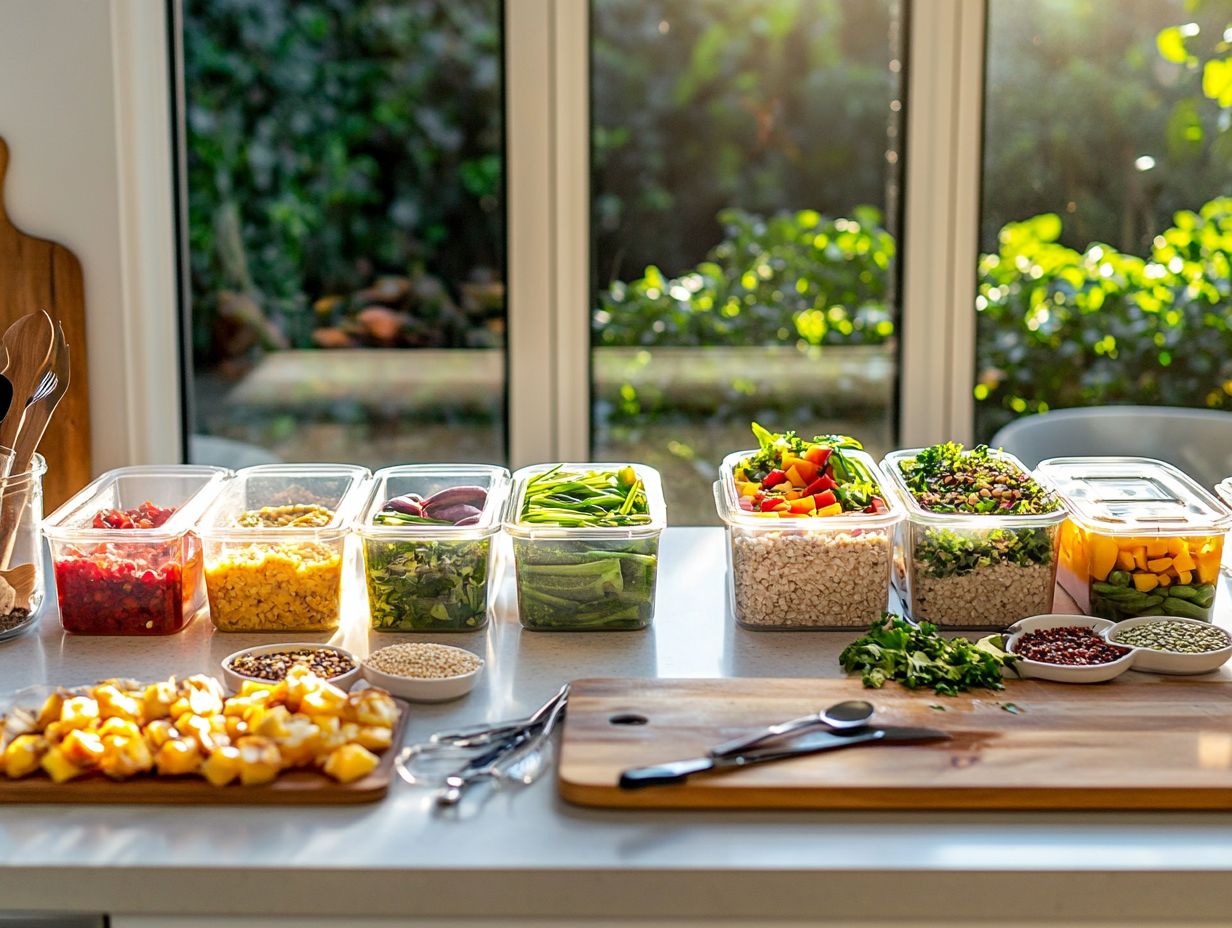
Adding vegetarian, vegan, and gluten-free meals to your prep opens a treasure trove of nutritious recipes catering to diverse dietary needs.
Embrace these vibrant culinary choices to uncover heart-healthy quinoa salads brimming with seasonal vegetables or savory chickpea and spinach stir-fries that satisfy hunger while providing a generous dose of protein. If you’re exploring a vegan lifestyle, consider batch-cooking lentil soup, rich in fiber and essential nutrients, that can be frozen for future meals.
For those who appreciate gluten-free fare, cauliflower rice bowls topped with roasted chickpeas and tahini offer a satisfying crunch along with a wealth of antioxidants. These meals promote energy levels and support your immune system, seamlessly fitting into your weekly meal plans.
Incorporating Meal Prep into Your Routine
Incorporating meal prep into your routine is vital for cultivating a sustainable habit. This sharpens your cooking skills and ensures you stay committed to healthy eating throughout the week.
Join the meal prep movement today for healthier, easier meals!
Making it a Sustainable Habit
Transforming meal prepping into a sustainable habit takes commitment. Smart planning and cooking techniques make it fun.
Embrace a variety of ingredients and explore different recipes. Turn the routine task of meal prepping into an exciting culinary journey.
Involving friends or family nurtures community and boosts motivation. Carve out a specific time each week, perhaps while tuning into your favorite podcast, to establish a reliable routine.
Using high-quality containers for storage streamlines the process, making your meals easy to grab and go. These small adjustments can transform healthy eating from a chore into a truly delightful experience.
Frequently Asked Questions
What does meal prep mean?
Meal prep is the process of planning, preparing, and portioning out meals in advance for the week. This allows for healthier eating habits and saves time during busy weekdays.
How do I start meal prepping for a healthy week?
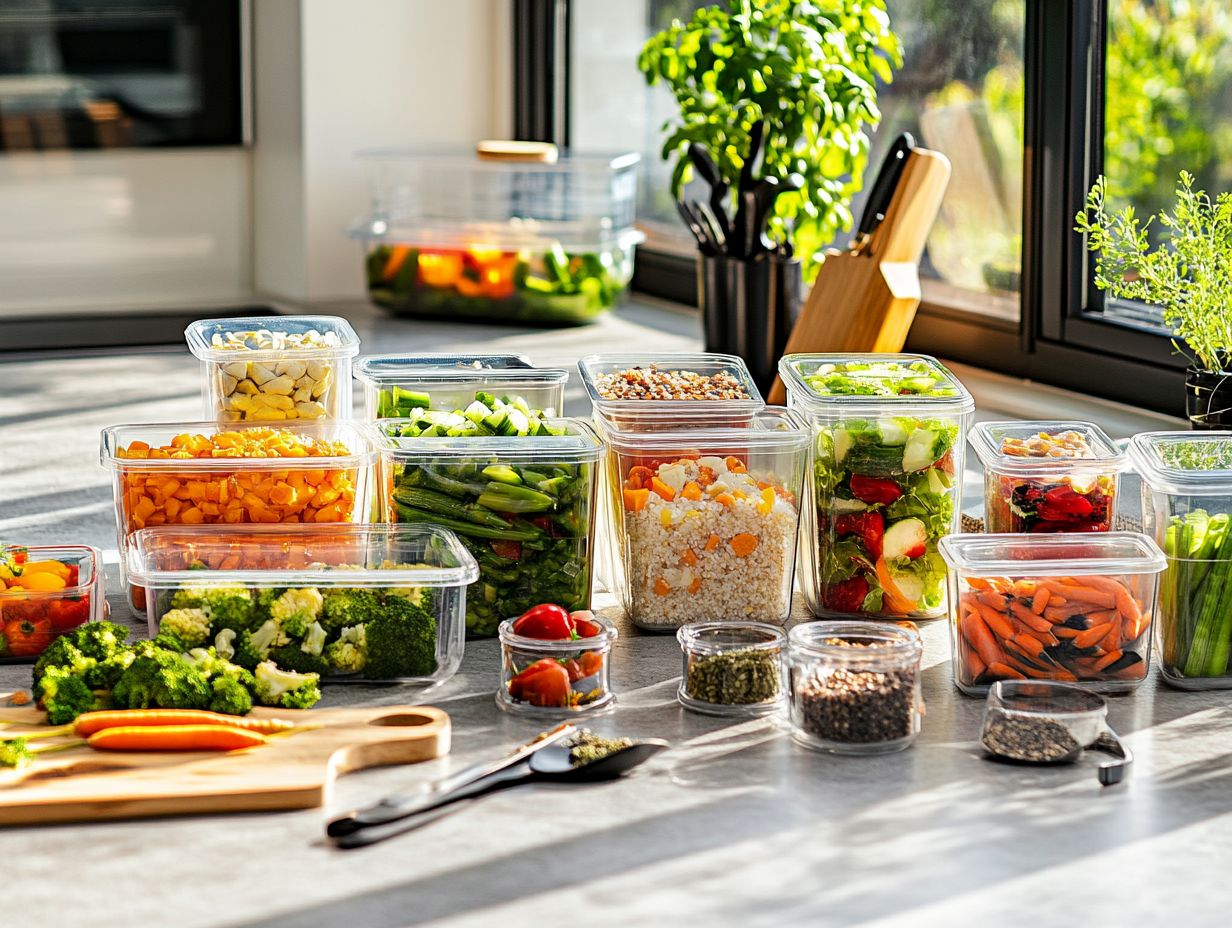
The first step is to choose a day of the week, typically Sunday, to dedicate to meal prepping. Next, plan out your meals for the week and make a grocery list. To make the most of your efforts, consider exploring how to use superfoods for meal prep. Then, set aside a few hours to cook and portion out your meals for the week.
What are some healthy meal prep ideas?
Some healthy meal prep ideas include making overnight oats for breakfast, roasting a variety of vegetables for easy side dishes, and preparing lean proteins like grilled chicken or fish. You can also portion out healthy snacks like nuts, fruits, and vegetables for easy grab-and-go options.
How long can meal prepped food stay fresh?
Generally, properly stored and refrigerated meal prepped food can last for 3-4 days. However, it’s important to always check for any signs of spoilage before consuming. If you’re unsure, it’s best to err on the side of caution and discard the food.
Can I freeze meal prepped food?
Yes, you can freeze meal prepped food for longer storage. It’s important to properly package and label the food with the date before freezing. When ready to eat, make sure to thaw and reheat the food thoroughly before consuming.
How can I make meal prepping more affordable?
To save money while meal prepping, choose fresh, in-season produce and buy in bulk. Incorporate plant-based proteins like beans and lentils. Don’t forget to use leftovers creatively to make new dishes!

